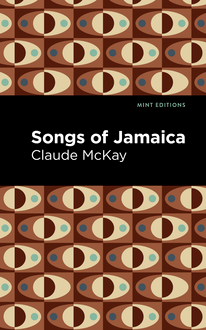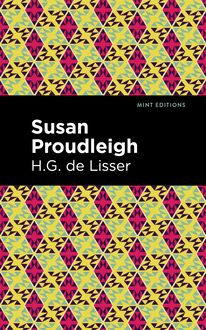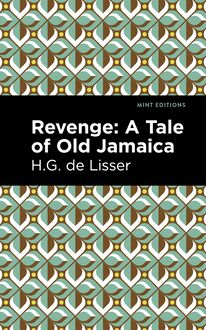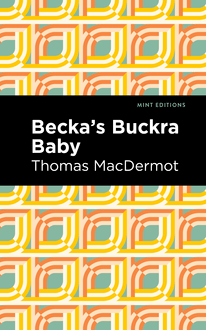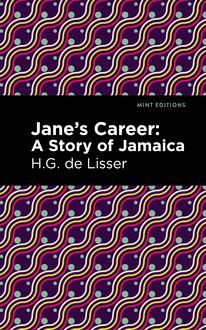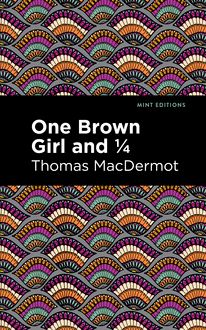-
 Univers
Univers
-
 Ebooks
Ebooks
-
 Livres audio
Livres audio
-
 Presse
Presse
-
 Podcasts
Podcasts
-
 BD
BD
-
 Documents
Documents
-
- Cours
- Révisions
- Ressources pédagogiques
- Sciences de l’éducation
- Manuels scolaires
- Langues
- Travaux de classe
- Annales de BEP
- Etudes supérieures
- Maternelle et primaire
- Fiches de lecture
- Orientation scolaire
- Méthodologie
- Corrigés de devoir
- Annales d’examens et concours
- Annales du bac
- Annales du brevet
- Rapports de stage
La lecture à portée de main
Vous pourrez modifier la taille du texte de cet ouvrage
Découvre YouScribe en t'inscrivant gratuitement
Je m'inscrisDécouvre YouScribe en t'inscrivant gratuitement
Je m'inscrisEn savoir plus
Vous pourrez modifier la taille du texte de cet ouvrage
En savoir plus

Description
One Brown Girl and ¼ (1909) is a novel by Thomas MacDermot. Published under his pseudonym Tom Redcam by the All Jamaica Library, One Brown Girl and ¼ is a tragic story of race and class set in Jamaica. Understated and ironic, the novel critiques the social conditions of Jamaica under British colonialism. Through the character of Liberta Passley, a wealthy woman of mixed racial heritage, MacDermot sheds light on the disparities between the island’s black and white communities, crafting a story now recognized as essential to modern Caribbean literature. “‘I?’ said Liberta Passley, ‘am the most unhappy woman in Kingston.’ She was not speaking aloud, but was silently building up with unspoken words a tabernacle for her thoughts. She considered now the very positive assertion in which she had housed this thought, went again through its very brief and enigmatic terms, and then deliberately added the further words: ‘and in Jamaica.’” Despite her beauty, wealth, education, and social standing, Liberta Passley is unable to feel satisfied. Raised as the only surviving daughter of a wealthy Englishman and his formerly-enslaved wife, Liberta feels she must ignore her mother’s side of the family as a means of rejecting her African roots. Manipulating her father, she arranges for her Aunt Henrietta, her mother’s only surviving sister and their loyal housekeeper, to be fired and thrown out. Thinking she is making a decision for her own good, she unwittingly welcomes disaster into her life. With a beautifully designed cover and professionally typeset manuscript, this edition of Thomas MacDermot’s One Brown Girl and ¼ is a classic of English literature reimagined for modern readers.
Sujets
Informations
| Publié par | Mint Editions |
| Date de parution | 28 mai 2021 |
| Nombre de lectures | 0 |
| EAN13 | 9781513223490 |
| Langue | English |
| Poids de l'ouvrage | 3 Mo |
Informations légales : prix de location à la page 0,0500€. Cette information est donnée uniquement à titre indicatif conformément à la législation en vigueur.
Extrait
One Brown Girl and ¼
Thomas MacDermot
One Brown Girl and 1⁄ 4 was first published in 1909.
This edition published by Mint Editions 2021.
ISBN 9781513299914 | E-ISBN 9781513223490
Published by Mint Editions®
minteditionbooks.com
Publishing Director: Jennifer Newens
Design & Production: Rachel Lopez Metzger
Project Manager: Micaela Clark
Typesetting: Westchester Publishing Services
To Sir Henry A. Blake, K.C.M.G., formerly Governor of Jamaica .
Sir ,
Years ago, when it was my purpose to publish a book of verses, I sought and obtained your permission for the volume to be dedicated to you. You gave that permission most kindly and helpfully and added some advice which was doubly valued as being instinct with good feeling and as coming from one who was of experience as an author in the fields towards which my face was set.
The volume then planned was never published, so deeply and so darkly has the tide of Circumstance flowed between my purpose and its achievement. But after many days I bring to the issue this story, and now, without applying for a transfer of that kindly permission from the one volume to the other, I have taken the liberty of dedicating this book to you.
I do so because, in the first place, I know that an attempt of the sort to portray life as it moves in its Jamaica variations, even an attempt with the failings that attach to this will always interest yourself and Lady Blake; and, secondly, because it is a pleasure and an inspiration to me to identify my book with one whom we in Jamaica remember so well for his cheerfulness of thought, his optimism of purpose and for his grace and power in the literary art.
To you, therefore, Sir, I dedicate this volume knowing that
“though its faults be thick as dust
In vacant chambers, I can trust
Your kindness.”
T OM R EDCAM
C ontents
I. Liberta Passley and some of her ways and meanings. Old Peter as owned by Liberta—His rebellious hair and clothes—What Liberta wrote on her tablets—The arithmetic of humanity—Mrs. Cariton’s understanding of it.—Whence Liberta’s name came—Liberta No. I—The Doctor’s Dictum—“The Princess” and Waiting Time—“Hell in a House”—How Aunt Henrietta’s “Kingdom” fell.
II. Enter some other people, Ada Smith and a casual Harold—“The Unfair Treatment of some Jamaicans”—Captain Burn’s words and Liberta’s thoughts—Liberta’s “disease”—The Reader who did not comprehend—And the Listener who did—Ada explains why—Noel as Referee .
III. Mrs. Gyrton and the afflictions of some other Mudfish—The Father who was Resurrected—Theories of Taxes— The Prince of Wales and the Secret of Raphael White—Governors and Collectors—“Coughing up Taxes”—Marriage and Money—Mr. Grant’s Proposal and His Views on a Wife.
IV. The Slaying and Eating of the Last Fowl—The Pouring Forth of Debate—Into Theological Mazes—Prayer—The Devil and the Carpenter—A Final Surprize.
V. Between the jaws of the Meffalas—Fidelia, the Coromantee—The smiting of John Meffala on the mouth—The Sot at Midnight—The Order of the supple-jack—The tragic work-seeker—Through wine to truth—A misinterpreted meeting.
VI. Pic-nicking on the Mountain-tops—And on the Plain—Dragons of the Past—In the Tropical Moonlight—The Reader and her Audience of one— Miss Vera and her Story .
VII. The Letter addressed by a Lady—Harold Entertains Ada—The Beauty and Her Beast—“I do Love You”— Two Interpretations—When One Receives and Gives a Shock.
VIII. When a Young Woman Knows Her Own Mind— And a Young Man Does Not—The Figure Beside The Carnations—Ada Meets a Colonial Secretary.
IX. A Duel: Harold vs. Noel—Love, Creator and Creature—Responsibilities—What Percival Road Held in the Starlight—The Cross Roads’ Pause in Life— What Noel Remembered: and What She Forgot— Calling a Beautiful Body to the Bar of Judgment.
X. Human Fingerposts Up and Down—The Sinner by the Wayside—“God’s Best Dog” smells Sin—Into the Silence—After Church With Meffala and Ada— A Minute in Oblivion.
XI. When Bachelors are Merry—High Jinks, Musical and Otherwise—Something That “Stank Of Lawley”—George announces an Interruption, and a Lady—What Harold Expected on one side of a Door—And What He Found on The Other Side.
XII. In Which Everything Depends On Noel—When One Decides By Refusing To Decide—The Way Harold Did It—The Way Noel Did It.
XIII. The Yielding Of Weakness—Ada in Noel’s Room—Phantoms and Realities Today on The Hills— Tomorrow on the Plains.
XIV. Tells The Beginning of a Soul Hunt—The Trail Of a Woman’s Soul—Noel Follows It—The Last Step On Life’s Staircase—Liberia Tries to Pick The Meffala Lock—How Cariton Unconsciously Did Something Important—The Major Sees Behind the White Sepulchre of Decency.
XV. Tells How The Major Handled Meffala, Junior— And Continues a Hunt—With Digressions.
XVI. In Which we Leave the Soul Hunters—And Study the Soul At Close Quarters—Under Coralilla Bowers —A Crisis, via A Bad Coin Plays an Important Part—Ada’s Theological Convictions—Cold Water In a Glass and Elsewhere—An Attempted Deal in Gold Bangles—Peeping In at the Cottage Window— And after.
XVII. Gleaning in the Wake of The Hunt—Liberta’s Review and Foreview for Ada’s Benefit—The Major’s Counter-view Unexpressed—Rumours True And Untrue— Meffala Returns to Oblivion—And We Leave The Major at a Black Moment.
T HE “ U NUSUAL” P REFACE
I t is unusual to write a preface to a Novel. I admit it. But the unusual is sometimes the necessary, and, then, to avoid it because it is unusual is as odd and irrational, really, as to hob-nob with it on the streets of the daily commonplace. There are a few things of which it is right and proper to remind the reader as one pushes out a venture such as this to traverse the seas of local literature. Thus comes this preface.
In the face of much kind advice to the contrary, appreciated though not followed, the writer has deliberately chosen to publish this story here, and to seek a Jamaican audience rather than an audience abroad. The M.S. has not, so far, been submitted to any publisher outside Jamaica. There are two reasons for this. One is that the chief ambition of the present writer in matters literary is to produce among his fellow Jamaicans, that which Jamaicans will care to read, and may find some small reason for taking pride in as the work of a Son of the Island.
If this ambition is a reprehensible one, I still plead guilty to it, for I am guilty.
The second reason for local publication is that, to fit a local story for publication abroad, as experience teaches one, there must be sacrificed much in local colour, detail and dialect that seems to the unhampered judgement needed to render the picture as conceived by the writer a faithful one.
I clearly understand, of course, that the fullest possible success here, cannot give the reward in money that would accompany even moderate success abroad. I am not so unreasonable as to expect this. But I do expect that, if I have produced something that merits success, Jamaicans can and will support it sufficiently to save its author from loss. If, for once I may confess it, the desire to make as much money as possible has long since lost for me even the small degree of attractiveness it once had. That my labour should return me a decent living wage, allowing enough for my essential needs and permitting me, when occasion calls, to do something for a fellow-being in need; that is what I desire.
The world’s tide of eager money-seekers goes past my door, and I hear the sound thereof, and, knowing full well whence these come and whither they go, I am content to remain under my own vine and fig tree and let the tide sweep on. I desire to get from this Novel a reasonable return in money, but to increase the chance of swelling this, I have not thought it well to sacrifice conditions which seem to me to allow best of the working out of the idea from which this story and other stories spring. I say “other stories,” for, if the public of Jamaica co-operate by the purchase of this volume, there are other stories to follow along the same channel of publication.
Now I would make it very clear that I ask no one, on the sentimental grounds of patronising a local writer, or supporting local literature, to pay a shilling for what he or she does not want; but this I do ask, as the minimum of fairplay to this or to any local independent publication, whether by myself or by another, that those who want to read the book, and that those who read it and like it, buy it.
I emphasize this the more readily because it is of vital concern to all local writers. Only by this minimum of fairplay can there ever be the slightest chance of fostering the growth of an Island literature. All the fine talk in the world, and all the nice expressions of enthusiasm and regard, will avail little, if the enthusiasts do not buy the local publication that they declare so well deserves support.
It costs not a little in money to produce a volume here; at best, one cannot expect a very large sale; few local writers, (and I am not among the few) have leisure for literary work, apart from the bread and butter routine. Such a story as this, therefore, has to be written as occasion serves, in fragments of time rescued from that somewhat trying routine. The writer has had to do the exacting work of passing these pages through the Press without any relaxation of attention to the daily labour for a living wage.
He is only too conscious, that, thus pressed and elbowed, shadowed also by ill-health, he has worked at a disadvantage, and perhaps the kindly reader, bearing this in mind, will treat him, not as that cold abstraction, “an author,” but as an erring man and a brother.
It is one thing to write in the golden leisure of a writer who can choose time and place; there the pleasure is well-nigh unalloyed, to the author,
-
 Univers
Univers
-
 Ebooks
Ebooks
-
 Livres audio
Livres audio
-
 Presse
Presse
-
 Podcasts
Podcasts
-
 BD
BD
-
 Documents
Documents
-
Jeunesse
-
Littérature
-
Ressources professionnelles
-
Santé et bien-être
-
Savoirs
-
Education
-
Loisirs et hobbies
-
Art, musique et cinéma
-
Actualité et débat de société
-
Jeunesse
-
Littérature
-
Ressources professionnelles
-
Santé et bien-être
-
Savoirs
-
Education
-
Loisirs et hobbies
-
Art, musique et cinéma
-
Actualité et débat de société
-
Actualités
-
Lifestyle
-
Presse jeunesse
-
Presse professionnelle
-
Pratique
-
Presse sportive
-
Presse internationale
-
Culture & Médias
-
Action et Aventures
-
Science-fiction et Fantasy
-
Société
-
Jeunesse
-
Littérature
-
Ressources professionnelles
-
Santé et bien-être
-
Savoirs
-
Education
-
Loisirs et hobbies
-
Art, musique et cinéma
-
Actualité et débat de société
- Cours
- Révisions
- Ressources pédagogiques
- Sciences de l’éducation
- Manuels scolaires
- Langues
- Travaux de classe
- Annales de BEP
- Etudes supérieures
- Maternelle et primaire
- Fiches de lecture
- Orientation scolaire
- Méthodologie
- Corrigés de devoir
- Annales d’examens et concours
- Annales du bac
- Annales du brevet
- Rapports de stage
